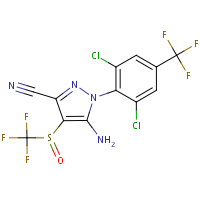Fipronil molecular formula (SEE ADVERSE EFFECTS)
TAIPEI, Taiwan — Farmers will be legally banned from spraying fipronil on tea trees as of Jan. 1 next year, according to an announcement by the Council of Agriculture (COA) yesterday.
Since the tea scare broke out this April, several cases of fipronil contamination have been discovered. Fipronil is a pesticide widely used overseas and also on farms in Taiwan. Current laws allow 0.002 ppm of fipronil to be detected on tea leaves; however, starting 2016, no amount of fipronil will be allowed, officials said yesterday at the Legislative Yuan.
The International Agency for Research on Cancer (IARC) has classified fipronil as a probable carcinogen, according to COA officials, and prolonged exposure or overconsumption of fipronil may increase the risk of thyroid tumors as well as birth defects.
According to Huang Cheng-hua, senior researcher at the Taiwan Agricultural Chemicals and Toxic Substances Research Institute (TACTRI), more than 80 pesticides are legally allowed on tea in limited quantities, and fipronil is still allowed on farm crops, including rice, corn, eggplant, chrysanthemum, red beans, cucumbers and brassica vegetables.
Huang added that while fipronil sprays will be entirely banned beginning January 2016, fipronil pills will remain legal pesticides. Fipronil pills are mainly used to destroy parasites in soil.
Residue Investigations Target Imported Tea
While the COA announced the ban on fipronil sprays for tea effective next year, it also revealed that most tea chains are supplied with imported tea.
The nation grows around 14,000 tons of tea leaves every year, with 10 percent supplying commercial tea chains, according to the COA. Around 32,373 tons of tea leaves are imported every year, forty-three percent of which is black tea and 33 percent green tea. Ninety percent of imported tea goes to tea chains, officials said.
Officials said that the Food and Drug Administration (FDA) will further investigate the usage and regulation of pesticides in countries from which a large proportion of the tea used by tea chains is imported.
The Ministry of Health and Welfare (MOHW) will begin a six-month project on imported tea, scrutinizing tea leaves from Vietnam, China, Sri Lanka, and India, as well as herbal tea leaves from Germany, China, Morocco and Sri Lanka, Minster Chiang Been-huang said yesterday.

